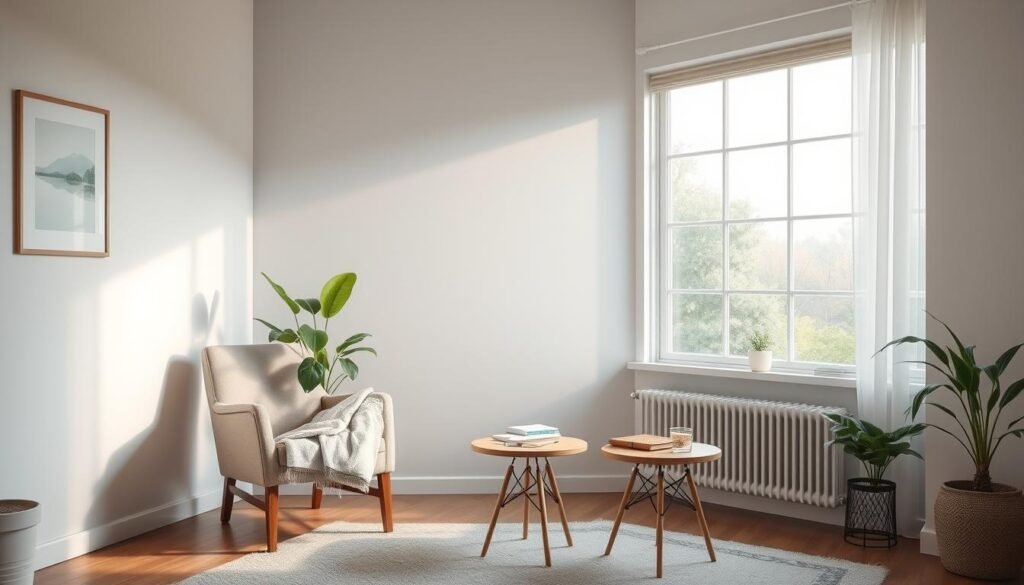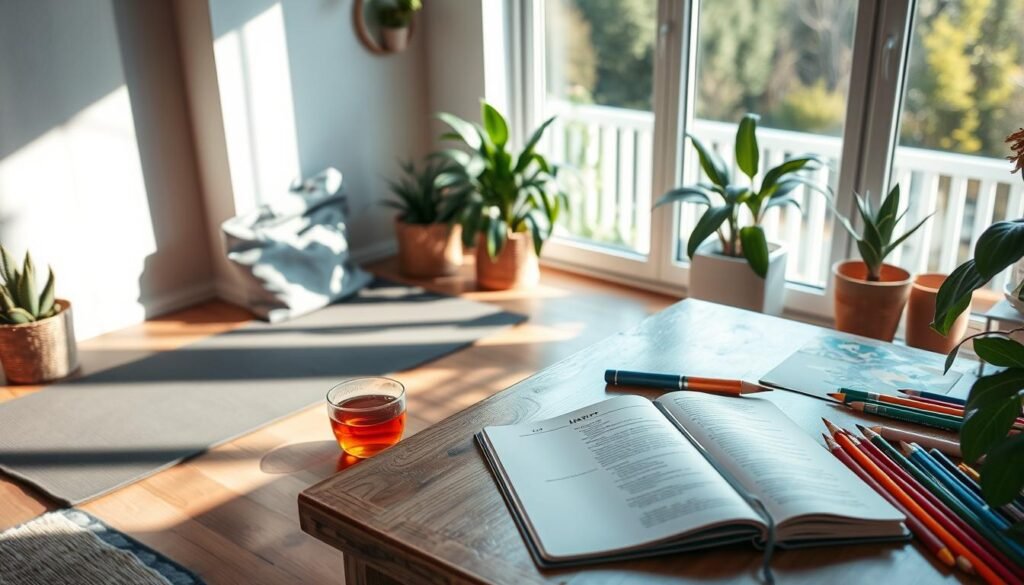Did you know nearly 1 in 5 adults in the U.S. faces anxiety each year? Anxiety isn’t just a small worry. It’s a big reaction to danger, seen or unseen. Millions suffer, disrupting their daily activities. It’s key to understand how to manage high anxiety. Good coping methods can lessen the symptoms and boost health. It’s vital to tell the difference between normal stress and an anxiety disorder to find relief.
This article shares expert advice on beating anxiety disorders. It gives practical tips and ways to get support. From spotting triggers to using calm-down techniques, you’ll learn how to handle your mental health better. We want to inspire you to take steps to control your anxiety, not let it control you.
Key Takeaways
- Anxiety affects 1 in 5 adults in the U.S., showing how common it is.
- Knowing the difference between feeling anxious and an anxiety disorder is crucial.
- Quick coping methods, like the 4-7-8 breathing technique, can ease symptoms.
- For lasting benefits, identify triggers and consider therapies such as CBT.
- Journaling and meeting with friends are also important for managing anxiety well.
- Getting personalized help from professionals can make a big difference.
Understanding Anxiety and Its Impact
Anxiety is a common reaction to stress. It affects our mind and body in many ways. Knowing about anxiety helps us identify its signs. Symptoms include a fast heartbeat, a lot of sweating, and changes in how we act. It’s important to see these signs early. That way, people can get the help they need quickly.
What is Anxiety?
Anxiety is our body’s way of responding to stress. It warns us about dangers and challenges. A little anxiety can make us focused and ready. But too much can be overwhelming. Every year, about 20% of Americans face anxiety disorders. These disorders can make daily activities really hard.
Different Types of Anxiety Disorders
There are many types of anxiety disorders. Each has its own symptoms and causes. Let’s look at some:
- Generalized Anxiety Disorder (GAD) – Nearly 7 million people in the U.S. suffer from it. It causes a lot of worry and tension.
- Panic Disorder – Around 6 million people have it. It brings sudden feelings of terror when there is no real danger.
- Social Anxiety Disorder – It affects about 15 million Americans. People feel very self-aware and scared in social settings.
- Specific Phobias – This is when someone is extremely afraid of certain things or situations, making life tough.
Knowing the types of anxiety disorders is key to getting help early. Techniques from Cognitive Behavioral Therapy (CBT) can make a big difference. The U.S. Preventive Services Task Force urges anxiety screening for everyone. This includes pregnant women and new moms. To learn about anxiety’s physical signs, click here. It’s crucial for battling anxiety.
Identifying Your Anxiety Triggers
Understanding where your anxiety comes from is key to tackling it. Each person has their own specific triggers. These can be things like stress at work, issues with friends or family, or money worries. Knowing what leads to your anxiety is the first step in overcoming it. This knowledge can help you live a better life.
Common Triggers for Anxiety
Knowing what might set off your anxiety is important. Let’s look at some usual triggers:
- Drinking a lot of caffeine, especially from coffee and energy drinks
- Big life changes, like finishing school, starting a new job, or having a baby
- Worries about money, such as budgeting, bills, and saving for the future
- Health issues, like problems with your heart or thyroid
- Using substances, including alcohol and stimulants like amphetamines
- Not getting enough sleep or sleeping poorly
- Stress from personal relationships or disagreements
Keeping a Journal to Track Your Feelings
Writing in a journal can help manage anxiety. Documenting how you feel each day can show what’s triggering your anxiety. This can help you notice specific things or thoughts that make your anxiety worse. With this info, you can find better ways to cope.
Over time, keeping track of your feelings can help you take charge of your anxiety.
In short, finding out what triggers your anxiety is a big part of dealing with it effectively. By keeping an eye on how you’re feeling, you can discover things that help you feel more stable and calm.
| Trigger Type | Examples | Management Strategies |
|---|---|---|
| Caffeine-related | Too much coffee or energy drinks | Try cutting back, choose drinks without caffeine |
| Life changes | Changes in job, moving to a new place | Practice being in the moment, ask for help if needed |
| Financial worries | Dealing with bills, savings | Make a spending plan, talk to a money expert |
| Health problems | Issues with heart, thyroid | Talk to doctors for advice |
| Sleep issues | Can’t sleep, waking up a lot | Start a sleep routine, get help from a doctor |
How to Cope with High Anxiety
Dealing with high anxiety needs a mix of methods to manage it. Healthy habits, supportive places, and smart strategies can help. It’s key to take active steps to lower anxiety.
Effective Anxiety Management Techniques
Many techniques can help control anxiety. Here are some helpful methods:
- Relaxation exercises: Deep breathing can calm the nervous system, bringing peace.
- Regular exercise: Working out releases happy chemicals in the brain, cutting down bad feelings.
- Healthy eating: Eating right supports overall health, helping to combat stress from bad nutrition.
- Journaling: Writing feelings and thoughts can make you more self-aware, offering clear insights.
- Consistent sleep patterns: A steady sleep schedule is vital for mental health. It helps avoid stress showing up as headaches or high blood pressure.
The Role of Support Networks
Support networks are vital in handling anxiety. Connecting with others creates a sense of community, reducing loneliness. Sharing experiences and advice can give valuable new perspectives. It boosts positive ways to deal with anxiety.
When feeling too stressed, knowing there is help like the 988 Suicide & Crisis Lifeline brings comfort immediately.
Breathing Exercises for Anxiety Relief
Breathing exercises are great for easing anxiety. They help you relax and manage stress better. By taking deep breaths, you can trigger a relaxation response that lowers tension.
Simple Deep Breathing Techniques
Simple practices like diaphragmatic breathing help bring calm. For example, box breathing is a method where you breathe in for four counts, hold it for four, breathe out for four, and then pause for four. This routine helps calm the mind by controlling the breath. It also kicks the relaxation system of the body into gear.
The 4-7-8 technique is another easy method. You inhale through the nose for four counts, hold for seven, and exhale through the mouth for eight. This technique deepens relaxation.
- Diaphragmatic breathing: Focus on raising the abdomen rather than the chest to allow a deeper breath.
- Box breathing: Inhale, hold, exhale, and pause each for equal counts to create a rhythmic breathing cycle.
- 4-7-8 breathing: A unique method that combines inhalation, retention, and extended exhalation for greater relaxation.
Benefits of Controlled Breathing
Practicing these breathing exercises regularly has many benefits. Things like resonance breathing can make your heart rate more variable and reduce stress impacts on blood pressure. Controlled breathing also excites the vagus nerve. This can slow down your heart rate and make you feel more at peace.
Doing these exercises for 20 to 30 minutes each day can greatly cut down anxiety and stress. Also, techniques like lion’s breath have helped healthcare workers feel less stressed. This shows how these methods can help in various settings.
Adding breathing exercises to your daily life can really make a difference. They equip you with the tools to deal with anxiety better. If you want to know more about effective breathing exercises for stress relief, here’s a resource to explore.

Mindfulness for Anxiety Relief
Mindfulness is a key way to handle anxiety. It includes techniques like mindfulness meditation, which helps lessen anxiety symptoms and boosts well-being. Regular mindfulness practice brings calmness and fits easily into everyday life.
Practicing Mindfulness Meditation
Mindfulness meditation focuses on the now. The American Journal of Psychiatry found that Mindfulness-Based Stress Reduction (MBSR) lowers anxiety and panic levels. It aids people with various anxiety disorders, offering them relief.
A study in JAMA Internal Medicine showed small to moderate anxiety and depression drops with mindfulness. These findings back the effectiveness of mindfulness meditation.
- Body scan meditation: Focus on different parts of the body to enhance awareness and relaxation.
- Sitting meditation: Sit quietly and concentrate on your breath, allowing thoughts to come and go without judgment.
- Outdoor mindfulness: Engage the senses with nature, offering immediate anxiety relief.
Integrating Mindfulness into Daily Life
Adding mindfulness to daily life can make routine tasks more mindful. For example, use walking or eating times to focus on your breath or senses. This improves moment-to-moment awareness. Research shows 10 minutes of mindfulness boosts mental clarity and fights negative thoughts, helping those with anxiety.
To grow a mindful lifestyle, try these tips:
- Set aside time each day for mindfulness meditation.
- Explore mindfulness techniques during your commute or routine activities.
- Engage in reflective journaling about your experiences, emotions, and thoughts.
Valuing mindfulness can create significant mental health improvements. To fully integrate it into your life, practice consistently for six months.
Using these mindfulness strategies greatly aids those dealing with anxiety. It leads to better mental health and emotional strength.
Cognitive-Behavioral Therapy for Anxiety
Cognitive-behavioral therapy (CBT) is a way to tackle mental health challenges, especially anxiety. It teaches people to change negative thoughts and actions affecting them. These skills help fight anxiety more effectively.
Understanding CBT Principles
CBT principles show how thoughts, feelings, and actions are linked. Changing bad thoughts can lead to better feelings and behaviors. Important concepts include:
- Cognitive restructuring: Identifying and changing distorted thinking into something more positive.
- Behavioral activation: Doing activities that improve your mood and fight off withdrawal.
- Exposure therapy: Facing fears gradually can lessen anxiety over time.
- Relaxation techniques: Techniques like deep breathing help calm anxiety.
Studies show CBT for anxiety can improve life after around eight sessions. Many people see a big change in their well-being thanks to these methods.
Finding a Qualified Therapist
It’s key to find a therapist skilled in CBT for anxiety. You can ask health professionals or look through trusted online lists. Keep these points in mind when choosing a therapist:
- Check credentials: Make sure they are trained in CBT and have the right license.
- Read reviews: Feedback from clients can tell you about their success and approach.
- Assess compatibility: A good connection with your therapist is crucial for progress.
- Explore options: Decide if you prefer meeting in person or online.

Using CBT techniques with a skilled therapist can greatly help manage anxiety. With proper support, those with anxiety conditions can overcome obstacles and enjoy life.
Natural Remedies for Anxiety
Natural remedies can make managing anxiety better. People often turn to herbal supplements and diet changes for mental well-being. These methods help with anxiety relief.
Herbal Supplements and Their Benefits
Herbal supplements are becoming popular for easing anxiety symptoms. Some effective ones are:
- Chamomile: Studies show chamomile greatly lowers generalized anxiety disorder symptoms.
- Lavender: With its soothing effects, lavender aids in relaxation and calming the mind.
- Ashwagandha: This herb is known for its stress and anxiety reduction abilities.
- Passion Flower: Helps with anxiety and insomnia when used in herbal mixes.
It’s vital to talk with a healthcare expert before starting any supplements. For detailed info on these herbs, check here.
Dietary Adjustments for Better Mental Health
Changing your diet can help manage anxiety too. Eating foods rich in vitamins and minerals boosts mental health. Here are some tips:
- Eat foods with omega-3 like salmon and walnuts for better mood.
- Drink less caffeine. Too much can make anxiety worse.
- Stay hydrated. Not enough water can hurt your mood and mind.
- Choose whole grains, fruits, and veggies to keep energy and blood sugar levels steady.
By combining diet changes with herbal supplements, you get a full plan for tackling anxiety. This holistic approach can lead to better relief and mental health.
Lifestyle Changes to Manage Anxiety
Making changes in your lifestyle to deal with anxiety can really change your life. Getting enough exercise and sleep is very important for your mental health. These habits help with anxiety and bring balance to your life.
The Importance of Regular Exercise
Working out regularly is key to managing anxiety. It’s advised to do moderate exercise for at least 2½ hours a week. Or, for those who prefer it, 1¼ hours of intense activities a week works too. Doing exercise three to five times a week for 30 minutes each can really help with anxiety.
When you exercise, your body releases endorphins. These make you feel happier and more at peace. Mixing up moderate and intense exercises can be good, so you can find what works best for you. Trying different exercises like yoga or team sports can keep things interesting. It also helps to have a friend to exercise with for extra motivation.
Establishing Healthy Sleep Hygiene
Good sleep is crucial for handling stress and anxiety well. Healthy sleep habits include a regular sleeping schedule and a relaxing bedtime routine. Things like avoiding screens before bed and ensuring your room is peaceful can improve your sleep quality a lot.
It’s also smart to watch your intake of caffeine and alcohol. They can mess up your sleep and make anxiety worse. By sleeping better, you’ll find yourself more able to deal with daily stress.

Adopting these lifestyle changes can really help you handle anxiety better. Regular exercise paired with good sleep will lead to a happier, more balanced life.
Overcoming Anxiety Disorders with Professional Help
Professional help is key to beating anxiety disorders. Therapy, especially cognitive-behavioral therapy (CBT), effectively combats the negative thinking and actions linked to anxiety. Most people see a big change after 8 to 10 sessions. This therapy doesn’t just offer coping techniques but also emotional support, crucial for those battling anxiety.
Benefits of Seeking Therapy
Therapy brings many advantages for those with anxiety. The main benefits include:
- Coping Strategies: Therapists give tools to handle anxiety better.
- Emotional Support: It offers a space to share feelings and heal.
- Validation: Professionals affirm your experiences, reducing loneliness.
- Insight into Triggers: Knowing your triggers helps in avoiding them.
Utilizing Peer Support Groups
Peer groups are also crucial for overcoming anxiety. They offer a place to exchange stories and ways to cope, fostering community. Being in these groups helps people feel understood and less alone, which is great for recovery. The benefits of peer support include:
- Sharing Experiences: It’s a supportive space for talking about struggles.
- Learning Coping Mechanisms: You can find new strategies that work.
- Encouragement in Seeking Help: They encourage getting professional assistance.
- Building Resilience: These groups push you to face your challenges.
In the end, professional help and peer groups can really improve the battle against anxiety disorders. Taking advantage of these resources leads to healing and staying strong.
Conclusion
Dealing with high anxiety needs different strategies. These methods for easing anxiety are critical to understand. It’s key to know how anxiety feels and to spot the signs. This can range from a fluttery stomach to feeling swamped or snappy. Recognizing what sets off your anxiety helps in finding ways to manage it.
The article sums up that certain activities can help deal with anxiety well. Breathing exercises and mindfulness can boost your coping skills. It’s also vital to seek professional advice. Treatments like Cognitive Behavioral Therapy and prescribed meds can greatly aid those with severe anxiety.
Keeping a healthy lifestyle with regular exercise and good food also plays a huge part in lessening anxiety. If you need more help with coping strategies, check this resource. It offers more ideas on how to take back control from anxiety.